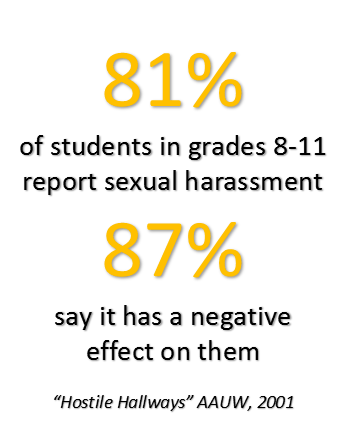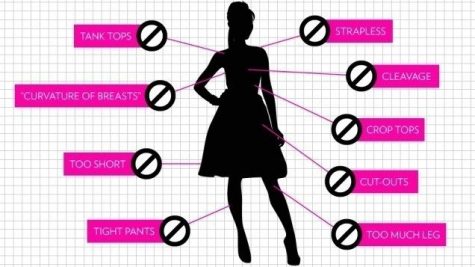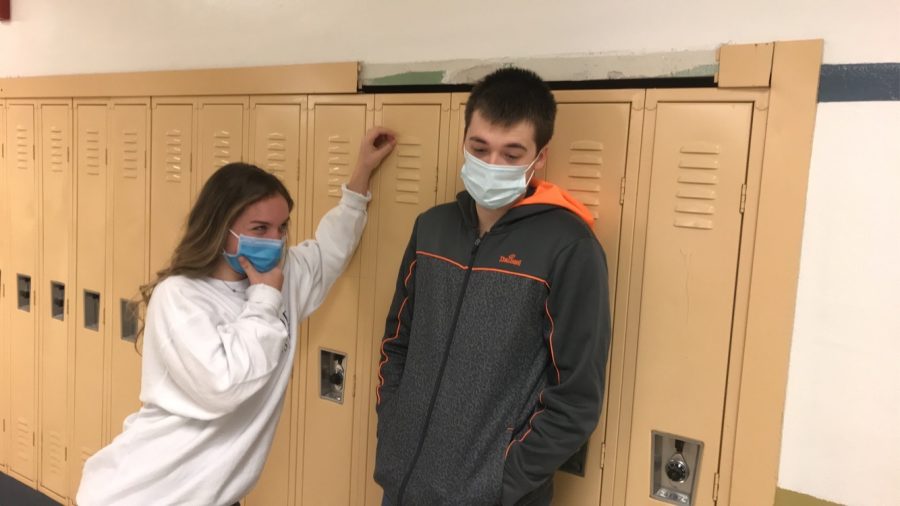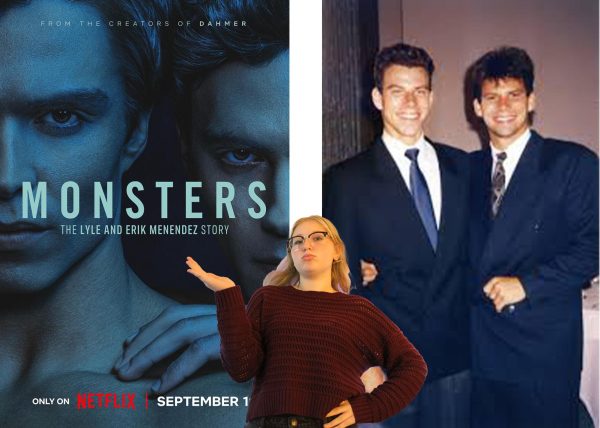When the Cat Calls Back
Ask any girl how they feel in a room full of men– they’ll more than likely tell you they feel nervous. Uneasy. Uncomfortable. Afraid. Ask any guy how they feel in a room full of women– excited. Energized. Happy. Maybe even powerful. It’s an unfortunate reality that not only grown adults have to deal with. We have to deal with it before we even enter the real world while we’re still students in high school, college, or scarily maybe even elementary or junior high. Sexual harassment is often brushed off as “cat-calling” or “boys being boys.” Girls are taught that when boys tease them or won’t leave them alone, it’s a sign of endearment and they should feel flattered, not violated. It’s no wonder victims of assault aren’t believed as a result of the negative stigma our society has placed on sexual abuse survivors. I’m sure if you’re a girl reading this, you have probably felt not entirely at ease around a man at best or terrified at worst. I wanted to see how students feel about these issues here at Knoch High School. Do they feel comfortable walking past a group of the opposite gender? Does it seem off-putting when a compliment from someone seems to go just a bit too far? Do guys feel the same way as girls? Are girls objectified to more negativity towards their appearance in the school place? I personally have heard and witnessed a lot of boys at our school crossing the line and making degrading or disrespectful comments towards women; I think our learning environment would be significantly better if we didn’t have to worry about unreasonable dress codes, unwanted attention from others, or anxiety caused from another making you uncomfortable.

I interviewed both girls AND boys throughout the grades here at Knoch to see how everyone feels about the subject. Are all of us on the same page about dress codes? Experiences with people of the opposite sex? Junior Hailee Ivanko hasn’t felt the absolute best in these hallowed halls of blue and gold, saying that “sometimes people of my opposite gender make degrading remarks about girls and it makes me disgusted.”
Senior Kaylynn Brumbaugh has felt similar feelings of discomfort. “Sometimes, I always wonder what they think whenever I wear something out of my comfort zone. Even if I have shorts on underneath I usually put my lunchbox behind my backside when I walk up stairs and keep my legs crossed when I sit just to be safe. I know boys probably aren’t looking, but it always weighs on my mind that someone probably is which is why I try to avoid wearing stuff like that too often,” she says.
Boys such as Junior Jack Walker experience different negative comments, not directed toward their bodies, but their style. “I’ve had people call me numerous names because of the way I dress, although I don’t take it personally,” he says. He adds that he doesn’t feel uncomfortable around the other gender at school, however.
It’s so run-of-the-mill that senior Josie Ansell states, “I am sure over the last 4 years someone somewhere has been ~that person~ to say something rude and uncalled for. Everyone experiences something like that and I am no exception.”
Senior Jeremy Fink, winner of “Best Dressed” in our senior class, feels relatively at-ease around girls and doesn’t get much, if any, unwanted attention, saying that “I don’t really feel uncomfortable with anyone. If I had to name an instance where I came close to something like that, I once wore a really tight shirt. Not as tight as [some others], but tight enough to get some unwanted attention.”
We’ve all been there, Jeremy.
Senior Kate McCarty says that she has received some negative remarks at school, from both genders. “It’s mostly derogatory comments about being a girl or about things that only girls have,” she said. The double standards are so bad Kate can’t even say boobs or breasts. “I’m respected by the good guys, but as teenage girls most boys our age don’t respect us as we wish they would. They talk down about our sports, about our abilities after we graduate (like yeah you get straight A’s and tutor me now but I’ll end up way better than you), they make fun of our goals, they make comments about the way we look, when we say we’re going to do something they’ll tell us to wear certain things as a joke, but there’s always some truth in jest. I get hurt by them sometimes, and I’m a very confident person, let alone other girls who might be just trying to do their best.”
But what about the dress code? I feel most comfortable when I show a little skin and express myself how I wish, and some days I can’t do that because my midriff or shoulders are exposed. It seems that girls get dress-coded far more often than the guys at our school, but I’ve never really understood why. I will be the first to admit that I’ve been distracted by what I’ve seen a guy wearing around the halls. The first that comes to mind is a shirt that said “Just the Tip” with a bullet on the front. Classy. Honorable Mentions are muscle shirts. Or a hoodie with the BLM acronym (which stands for Black Lives Matter in case you didn’t know) made to stand for “Biden Loves Minors.” But I STILL can’t show my knees.
Ivanko believes that the dress code is, “fairly lenient” while Brumbaugh disagrees. “Honestly the only thing I don’t understand is the shoulder restrictions. I can understand skirt length and shorts length but I think it’s different for everyone. And as girls I think we’re all pretty good at dress coding ourselves and making sure we’re not wearing anything inappropriate,” she said.
Ansell says, “Honestly, I don’t really know what the dress code is; however, I have noticed that girls tend to be dress coded way more frequently than the boys.”
Jack Wa lker has had a decent time of it and states, “I am lucky to have the style I do; I prefer to fit inside of the school dress code, so for me and my style, I think the dress code is great, however this isn’t the case with everyone.”
lker has had a decent time of it and states, “I am lucky to have the style I do; I prefer to fit inside of the school dress code, so for me and my style, I think the dress code is great, however this isn’t the case with everyone.”
Senior Jeremy Fink thinks that the FACULTY at our school are partially at fault, stating that “The dress code seems strict in the handbook and on paper, but anyone can see from a normal day at school that the dress code isn’t taken too seriously. In the hallways, people have started wearing what they want more and more, from hats to crop tops to pajamas. And the crazy thing? Some teachers have become a little lax on the dress code as well. Faculty are tending to wear more jeans and are not dressing up as much as they used to. That being said, there are still many, many teachers who take pride in their attire, and it shows. For instance, Mr. King loves his fashionable button-downs and well-kept suits. I’m guessing this current change in the dress code and the strictness of it overall is ultimately linked to this significantly different age we are all in. All in all, I support people wearing what they feel comfortable with, and I would think that the dress code is a little strict if it wasn’t bent every now and then by select students.”
McCarty also expresses that it’s more difficult for taller girls to dress to the standards of the rules as well. “I agree with a portion of the rules because some girls don’t have moms that teach them dressing a certain way doesn’t get them the right attention, but fashion is also a form of personal expression. We should still have the freedom to put on an outfit that makes us feel confident. I’m very tall so fingertip length shorts turn into bermudas on me, which might be some people’s cup of tea, but it definitely isn’t mine.” she said. “Crop tops are super cute, but again can’t wear them, even though we all have stomachs sooooo what’s that about. And how about I’ve been in front of the whole school in spandex as a part of my volleyball uniform, pretty sure some jean shorts are way better than that.”
At the end of the day, it’s up to us to treat one another with the respect we deserve. “I just ask that everyone thinks about what they say before they say it. Which is hard I know, trust me I have no filter, but we always have to remember that people have lives that you know nothing about. You see them at school. Big deal. Do you know their family situation? What about how many friends they have? How are their grades at the moment? Are they struggling to do something they love? What comments did their parents have about their outfit? We see the surface of everyone’s lives, and one off sentence that you think nothing about could really really hurt them,” McCarty states.
Fink adds that, “Most (but not all) of the issues root from administrators having a problem with female students and what they wear. For instance, I am probably not going to get written up for showing too much cleavage or wearing a spaghetti strap. I might get in trouble for wearing a short skirt, but that’ll be on me because I probably lost a bet or something. So, I suppose my question for you is why should men or male students have any say at all in what the correct fashion is for female students?”
Good question, Jeremy.
For our teachers, things are different. They aren’t teenagers anymore and they don’t go to school here. This is their workplace. In recent years, the push against sexual harassment in places where one works has gone up on society’s radar. Do teachers receive the same kind of comments from co-workers that they might hear at a less formal job perhaps without kids present? Is it any different being a teacher than a student in actuality? Are they aware of the problems presented to students at Knoch, especially young women? I asked Mr. King, our 10th grade History and Sociology teacher, some similar questions that I asked students. He says that he has witnessed harassment in the building. “Most of the time, harassment in school is not overt and easily detected. Sometimes, however, you can get a sense that a student is uncomfortable with another and if you dig a little into the problem you find out that inappropriate comments and gestures are being made without me being completely aware of it. I hope my students do not do it, and I hope that I am in tune with my class so it never happens. More often, there are thousands of interactions between students every day that are unnoticed or undetected by teachers in the hallway or in the cafeteria… I would think this is where the majority of harassment comes from.” Mrs. Lentz, the AP Lit 12, Debate, and Mythology teacher, as well as the hand sanitizer connoisseur of the O wing, states that she has also witnessed sexual harassment. “I have witnessed it countless times over the years to lesser and greater extents, unfortunately. I have reported a student or two to administration in the past for being inappropriate with another student or giving unwanted attention. It has been a long time, though. I have recently had to have a discussion with a student for lewd comments. I wouldn’t call that punishment, but we did have a talk.” Mr. King adds that he hasn’t witnessed any inappropriate interactions between teachers. Mrs. Lentz also adds that she doesn’t feel she would be treated any differently by her fellow teachers if she were a male, but the same has not always been the case with her students. “I do not, in general, feel disrespected by students because I am a female teacher, but I have in the past. I think that is on a very individual basis, not something students in general do. When I was a younger teacher, I think that happened more often, but with age comes some gravitas which helps. I do not think other teachers would treat me differently if I were a man. I believe my colleagues are very respectful and I am proud to work with them.”
Lentz and King have both heard several grievances from students about the dress-code, however. “In discussions with my students, (especially in Sociology where we discuss norms and deviance) I get the sense that many students think our dress code is more strict with girls than boys; to which I always say, ‘most boys I see wear jeans and hoodies.’ That is to say, I do not see boys pushing the limits of the dress code as much as female students. I could be way out of the ballpark on this, but it is simply the observations of one teacher,” King says. Lentz adds that, “It has been a long time since I have familiarized myself with the finer points of the dress code, but I think dress codes in general police girls more than boys. On the one hand, I think people should be aware of what they are wearing and how they present themselves, but I also don’t think exposing a shoulder is an issue.” Thankfully, King has never experienced harassment himself at his workplace. “Never. No one has ever harassed me. No one has ever harassed another student in my classroom with me being aware of it. When I first started teaching I was challenged by students, but not necessarily disrespected… You find as you get older, students don’t do much of either to me these days. If you respect students, 90% will give you respect in return.” Lentz, on the other hand, says that a student has made remarks that made her feel uncomfortable. When asked if King thought that female students felt comfortable around male peers in his classroom, he responded saying that, “Not always, but it is not because of harassment per se. It may be because boys can be annoying and immature, but not necessarily intimidating and sexually inappropriate. That said, a teacher has little clue about what happens outside of his/her classroom. Things that happen online or over the phone can often spill over into the classroom.” He feels confident that if he were a women, he would be treated much differently as a teacher. He adds that, “Teachers are not some super hero or Avenger who are always on guard for justice and fair play; we are human beings prone to mistakes and oversights like anyone else. I would like to think that my classroom is a place where all students are at home and free from intimidation, ridicule and harassment… but the truth is, I cannot detect all forms of this type of behavior and I would feel awful if these types of things were going on in my classroom without my knowledge.”
Self-expression is highly important, but not at someone else’s expense. If you wouldn’t want to hear a certain comment or be touched a certain way, just don’t do it to someone else. Nobody should have to feel afraid to go into their school for risk of sexual harassment.






